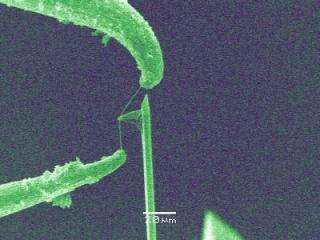:3333
When squirrel expert John Koprowski first saw a Malabar giant squirrel, also known as an Indian giant squirrel, he couldn’t believe his eyes.



Weather modification, according to the document, would support: forecasts of disasters such as drought and hailstorms, as well as zoning work in agricultural production areas; normal working plans for regions in need of ecological protection and restoration; and emergency response plans to deal with events such as forest or grassland fires, and unusually high temperature or droughts.
The country’s weather modification efforts would support emergency response plans to deal with events such as drought and hailstorms.



Circa 2006 o.,o.
Researchers at the National Institute of Standards and Technology and the University of Colorado at Boulder have designed a carbon nanotube knife that, in theory, would work like a tight-wire cheese slicer.
In a paper presented this month at the 2006 International Mechanical Engineering Congress and Exposition, the research team announced a prototype nanoknife that could, in the future, become a tabletop tool of biology, allowing scientists to cut and study cells more precisely than they can today.
For years, biologists have wrestled with conventional diamond or glass knives, which cut frozen cell samples at a large angle, forcing the samples to bend and sometimes later crack. Because carbon nanotubes are extremely strong and slender in diameter, they make ideal materials for thinly cutting precise slivers of cells. In particular, scientists might use the nanoknife to make 3D images of cells and tissues for electron tomography, which requires samples less than 300 nanometers thick.

Sunday marked the second time Kathy Sullivan made history.
Nearly 25 years after she became the first US woman to walk in space, Sullivan became the first woman to ever reach Challenger Deep, the deepest point in our planet’s oceans. She’s the only person ever to do both.
Challenger Deep lies nearly 7 miles (11 kilometres) below the Pacific Ocean’s surface within the Mariana Trench about 200 miles (300 kilometres) southwest of Guam.

For years, futurists have attempted to predict when, in the future, we will finally achieve the technological singularity’’ — a technological breakthrough so profound, it changes the course of humanity. Specifically, futurists have been talking about the moment when super-human artificial intelligence becomes reality. Or — to put it simply — when computers become smarter than people.
However, at Centaura, we believe that the world needs to prepare for a different singularity — one that might arrive even before super-human intelligence. It’s the moment when humans have the power to slow down — and even reverse aging.
The idea of the singularity first became popular nearly thirty years ago by the science fiction writer Vernor Vinge. In his essay The Coming Technological Singularity, he famously declared, Within thirty years, we will have the technological means to create superhuman intelligence. Shortly after, the human era will be ended.
Potholes may soon reach the end of the road, as an Oxfordshire village hosts the first UK trial of a graphene-based wonder material designed to prevent cracks forming.
Graphene is a super-strong material made of specially-structured carbon.
Work will begin today on laying a 820 yard (750 metre) –long stretch of the wonder material on the main road through Curbridge, west of Oxford.
Bitcoin has been hyped as the currency of the future. And it does have its advantages, as we discussed in the previous video. However, Bitcoin is far from perfect. Because of its finite supply, there is the real possibility of “lost Bitcoins” leading to lost fortunes. These lost fortunes may lead to the erosion of public trust in Bitcoin.
Discord Link: https://discord.gg/brYJDEr.
Patreon link: https://www.patreon.com/TheFuturistTom.
Please follow our instagram at: https://www.instagram.com/the_futurist_tom.
For business inquires, please contact [email protected].
Editor credits (Velinix):
https://www.youtube.com/channel/UCYcAMWx0Vcsy-SSzX3HVWYw?view_as=subscriber.
https://www.instagram.com/velinix/
https://twitter.com/Panda123Jewels